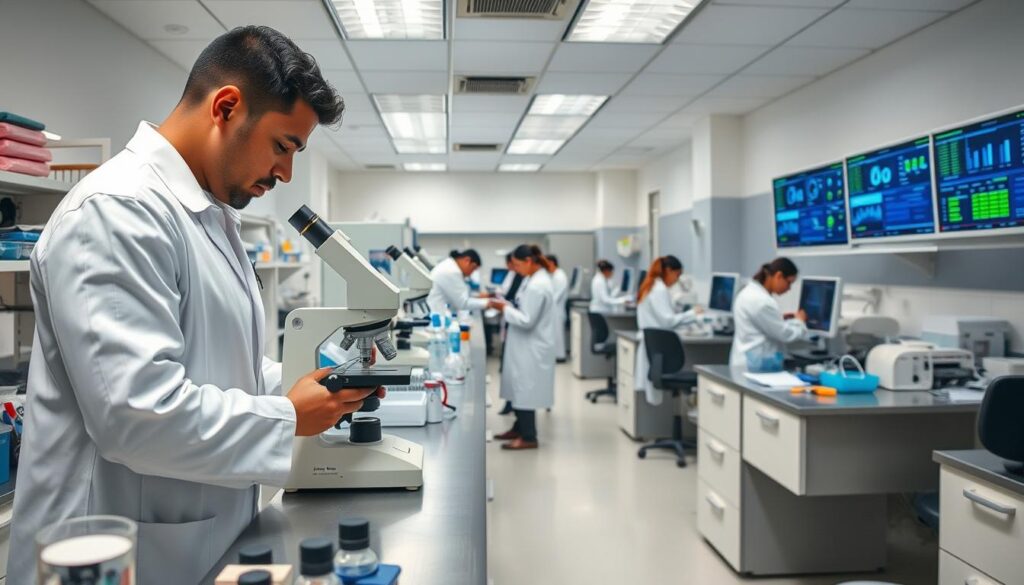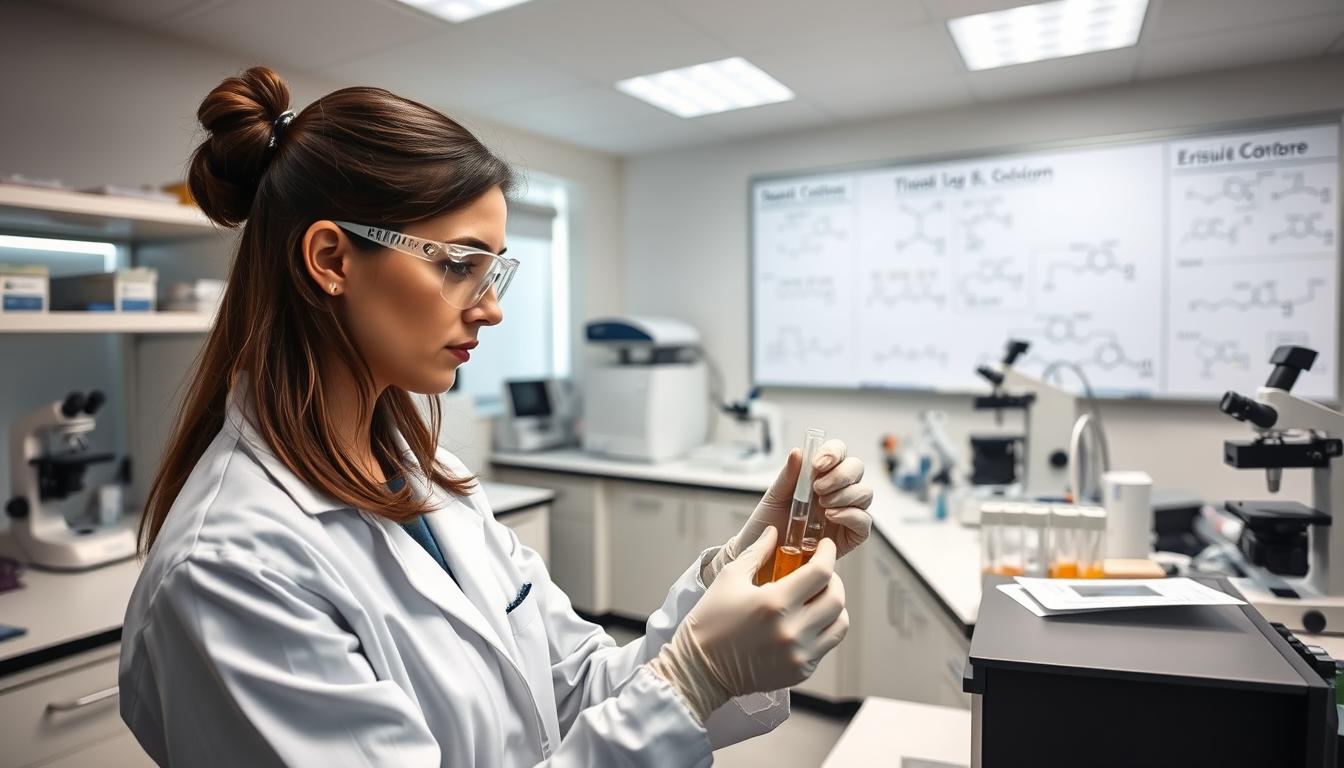The demand for skilled medical laboratory professionals is on the rise, with the Bureau of Labor Statistics projecting a 7% growth in employment opportunities from 2020 to 2030. This growth is driven by an aging population and an increased need for diagnostic testing.
To capitalize on these opportunities, individuals must undergo proper education and training to become proficient in laboratory procedures and techniques. Becoming a medical lab technician requires a comprehensive understanding of the steps involved in this career path.
Key Takeaways
- Pursue an associate’s degree or certificate in medical laboratory technology
- Gain practical experience through internships or clinical rotations
- Obtain certification from a recognized professional organization
- Develop strong analytical and communication skills
- Stay up-to-date with industry advancements and technologies
What Does a Medical Lab Technician Do?
Medical lab technicians play a crucial role in the healthcare system by conducting tests and analyzing samples. Their work is essential for diagnosing and treating patients.
Daily Responsibilities and Tasks
Medical lab technicians perform a variety of tasks, including collecting and processing samples, conducting laboratory tests, and maintaining equipment. They must also record and report test results accurately.
The daily responsibilities of a medical lab technician can vary depending on the healthcare setting, but they often involve working with complex machinery and following strict safety protocols.

Work Environment and Settings
Medical lab technicians work in various healthcare settings, including hospitals, clinics, and private laboratories. They often work in a fast-paced environment that requires attention to detail and organizational skills.
Difference Between MLT and MLS Roles
While both Medical Lab Technicians (MLTs) and Medical Laboratory Scientists (MLSs) work in laboratories, there are key differences in their responsibilities and qualifications. MLTs typically require an associate’s degree and perform tests and analyses under the supervision of MLSs or pathologists.
Understanding these differences is crucial for individuals considering a career as a medical lab technician, as it helps in making informed decisions about education and training.
Educational Requirements for Medical Lab Technicians
The journey to becoming a medical lab technician starts with understanding the educational prerequisites that are crucial for this profession. Aspiring technicians must navigate through a structured educational pathway to acquire the necessary knowledge and skills.
High School Preparation
High school students who are interested in pursuing a career as a medical lab technician should focus on science and mathematics courses, such as biology, chemistry, and mathematics. These subjects provide a foundational understanding that is crucial for further education in medical laboratory technology.
Associate Degree Programs
Most medical lab technicians hold an associate degree in medical laboratory technology or a related field. These programs, typically two years in duration, cover both theoretical and practical aspects of laboratory procedures and are offered by community colleges and some universities.
Bachelor’s Degree Options
While an associate degree is common, some individuals may choose to pursue a bachelor’s degree in medical laboratory science or a related field. Bachelor’s degree programs provide more in-depth study and can offer greater career flexibility and advancement opportunities.
Accredited Program Selection
It is critical to select a program that is accredited by a recognized accrediting agency. Accreditation ensures that the program meets certain standards and provides students with the necessary education and training.
NAACLS Accreditation Importance
The National Accrediting Agency for Clinical Laboratory Sciences (NAACLS) is a key accrediting body for medical laboratory technician programs. NAACLS accreditation is highly regarded and often required for certification and licensure.
Program Cost Considerations
When selecting a program, prospective students should also consider the cost of tuition, fees, and equipment. Program costs can vary significantly between institutions, and understanding these costs is essential for making an informed decision.
| Degree Level | Typical Duration | Institutions Offering |
|---|---|---|
| Associate Degree | 2 years | Community Colleges, Some Universities |
| Bachelor’s Degree | 4 years | Universities |
How to Become a Medical Lab Technician: Step-by-Step Process
Aspiring medical lab technicians must navigate a step-by-step process that includes education, clinical training, and certification to enter this rewarding field. The journey involves several key steps that are crucial for success in this profession.
Complete Required Education
The first step in becoming a medical lab technician is to complete the required education. This typically involves earning an associate’s degree in medical laboratory technology or a related field from an accredited program. Some institutions also offer bachelor’s degree programs, which can provide additional opportunities for advancement.
- Research and select accredited programs that fit your career goals.
- Ensure the program includes both classroom instruction and laboratory training.
Gain Clinical Experience
Gaining practical experience is essential for medical lab technicians. Many programs include a clinical internship or practicum, which provides hands-on experience in a real laboratory setting.
Key aspects of clinical experience include:
- Working under the supervision of experienced laboratory professionals.
- Performing various laboratory tests and procedures.
Obtain Certification
Certification is a critical step in the process. While requirements vary by state, many employers prefer or require certification. The most common certifications are offered by the American Society for Clinical Pathology (ASCP) and the American Medical Technologists (AMT).
- Prepare for the certification exam by reviewing relevant materials.
- Apply for certification through the chosen certifying organization.
Apply for State Licensure (If Required)
Some states require licensure to practice as a medical lab technician. It’s essential to check the specific requirements for the state in which you wish to work.
- Research the licensure requirements for your state.
- Submit an application and provide required documentation.
Find Entry-Level Positions
Once educated, certified, and licensed (if required), the final step is to secure an entry-level position. This can involve networking, tailoring your resume to highlight relevant skills and experience, and preparing for interviews.
Tips for finding entry-level positions:
- Utilize job search platforms and professional networks.
- Consider internships or volunteer work to gain additional experience.
Essential Skills and Qualities for Success
Becoming a proficient Medical Lab Technician requires a balanced set of technical skills and personal qualities. To succeed in this role, individuals must possess a strong foundation in both laboratory practices and interpersonal skills.
Technical Skills
Technical skills are crucial for a Medical Lab Technician. This includes:
Laboratory Techniques
Proficiency in various laboratory techniques such as venipuncture, microscopy, and culturing techniques is essential. Technicians must be adept at handling complex equipment and following precise protocols.
Computer and Technology Proficiency
Modern laboratories rely heavily on computerized systems for testing and result analysis. Medical Lab Technicians must be comfortable using laboratory information systems (LIS) and other relevant software.
Soft Skills
Equally important are the soft skills that enable effective collaboration and communication within the healthcare team.
Attention to Detail
Attention to detail is critical in a laboratory setting where small errors can have significant consequences. Technicians must be meticulous in their work, ensuring accuracy and reliability in test results.
Communication Abilities
Good communication skills are vital for conveying test results and information to healthcare providers. Technicians must be able to clearly document findings and communicate effectively with the team.
Problem-Solving Capabilities
The ability to troubleshoot and resolve issues that arise during testing is invaluable. Medical Lab Technicians should be able to analyze problems and implement appropriate solutions.
| Skill Category | Specific Skills | Importance Level |
|---|---|---|
| Technical Skills | Laboratory Techniques, Computer Proficiency | High |
| Soft Skills | Attention to Detail, Communication, Problem-Solving | High |
Career Outlook and Advancement Opportunities
The medical lab technician profession is experiencing significant growth, driven by the need for diagnostic services. As the healthcare industry continues to expand, the demand for skilled medical lab technicians is on the rise.
Job Market Trends and Salary Expectations
The job market for medical lab technicians is robust, with the Bureau of Labor Statistics predicting a 7% growth in employment opportunities from 2020 to 2030. This growth is driven by an aging population and an increased reliance on diagnostic testing.
Salary expectations for medical lab technicians vary based on factors such as location, experience, and employer. According to the Bureau of Labor Statistics, the median annual salary for medical laboratory technicians was $54,180 in May 2020.
| Experience Level | Average Salary |
|---|---|
| Entry-Level | $45,000 – $50,000 |
| Mid-Level | $55,000 – $65,000 |
| Senior-Level | $70,000 – $80,000 |
Specialization Options
Medical lab technicians can specialize in various areas, enhancing their career prospects and salary potential. Some specialization options include:
Hematology
The study of blood and its disorders. Hematology specialists analyze blood samples to diagnose conditions such as anemia and leukemia.
Clinical Chemistry
Focuses on the analysis of bodily fluids to diagnose and monitor diseases. Clinical chemistry specialists play a crucial role in patient care.
Microbiology
Involves the study of microorganisms and their impact on human health. Microbiology specialists help identify infections and develop treatment plans.
Blood Banking
Concerned with the collection, testing, and storage of blood and its components. Blood banking specialists ensure the availability of safe blood for transfusions.
Advancement to Supervisory Roles
With experience, medical lab technicians can advance to supervisory roles, overseeing laboratory operations and staff. This career advancement often requires additional education and certification.
Pursuing Further Education
Some medical lab technicians choose to pursue further education, becoming medical laboratory scientists (MLSs) or pathologist assistants. These advanced roles offer higher salary potential and greater responsibility.
In conclusion, the career outlook for medical lab technicians is promising, with opportunities for specialization, advancement, and further education. As the healthcare industry continues to grow, the demand for skilled medical lab technicians will remain strong.
Conclusion: Is a Medical Lab Technician Career Right for You?
Becoming a medical lab technician requires a combination of education, skills, and certification. By following the steps outlined in this article, individuals can pursue a rewarding career in medical laboratory technology. To become a medical lab technician, one must complete the required education, gain clinical experience, and obtain certification.
Medical lab technician education provides a foundation for a career in this field. With the right training and skills, individuals can succeed in this in-demand profession. The job market trends and salary expectations for medical lab technicians are promising, with opportunities for advancement to supervisory roles or specialization in specific areas.
If you are considering a career as a medical lab technician, evaluate your interests, skills, and career goals. With the right preparation and dedication, you can succeed in this field and contribute to the healthcare industry.
